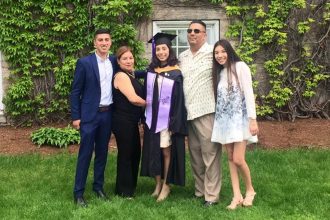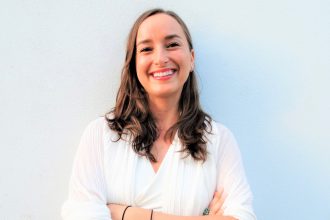MONICA VILLARREAL
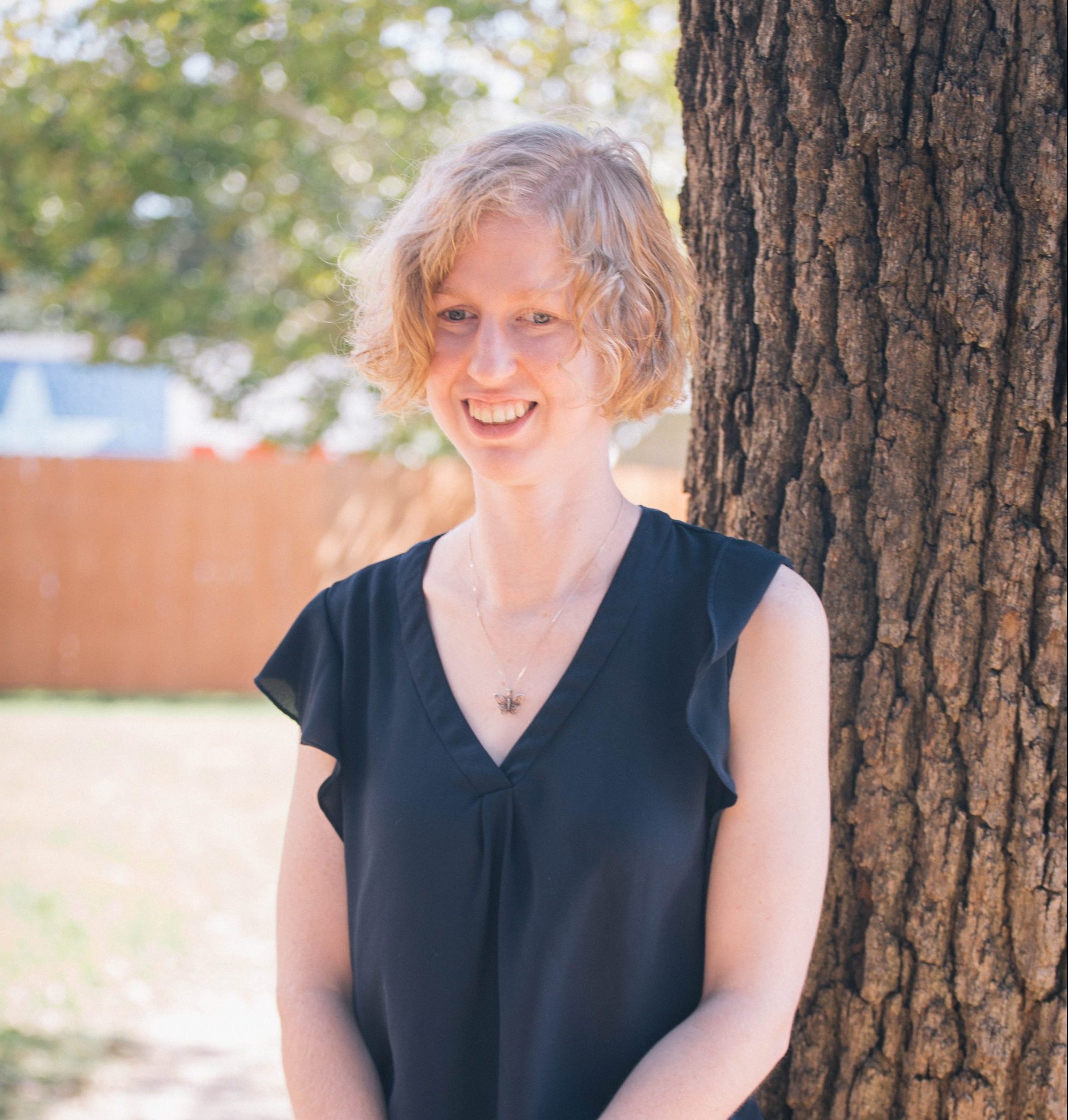
A SIGHT IMPAIRED LATINA WITH A GREAT SPIRIT AND ZEST FOR LIFE
Disability is not an obstacle to be successful
Mónica Villarreal deserves celebration! A young Mexican woman is a great example for her spirit despite her sight impairment, who has overcome the stereotypes and obstacles near blindness causes. She completed two Bachelor’s degrees in Government and Latin American Studies and a Master’s degree in Public Policy from the University of Texas at Austin. She founded the first association for students with disabilities at the University of Texas and proposed HB10 bill to benefit disabled people with mental health problems approved in 2017. In addition, she is part of the National Coalition of Latinx with Disabilities (NCLD) to help raise awareness of the movement for the rights of Latinos with disabilities in the United States.
When I met Mónica Villarreal Garza the first time I was attracted to her voice, cheerful and chatty in a cafe. She appeared and sounded self confident and with a booming sense of humor. Her movements and her words were precise. When I came over to say hello, she told me that she was from Monterrey, México and had studied from pre-school to high school at the American School Foundation in Monterrey, and she had continued to college at the university in Austin, «and by the way, I am blind,» she added.
I had never suspected she was blind and during the several conversations we had for this interview, I could appreciate clearly that she is a beautiful person inside and out, tall, slender and attractive with intense green eyes, lovely and without a drop of makeup. Mónica has achieved much more than many people whom have full use of their faculties.
Here she tells her story:
INHERITED GENE AND GRADUAL BLINDNESS
What were the reasons for your blindness?
My parents had the gene called abca4 and it is usually a recessive trait within their DNA but they did not know they had it. I am the oldest of three children. My brother has the same condition, but my younger sister was born without this problem, she has normal sight
When I was seven years old, I was diagnosed with this disease when school teachers noticed that I was beginning to have a hard time reading or adapting to bright light. After consulting many ophthalmologists in Monterrey, they sent us to Houston and there they diagnosed me with Stargardt disease, which deteriorates one’s eyesight until reaching blindness.
This disease was discovered by a German ophthalmologist with the same name in 1901. In rare cases, one in 20,000, macular degeneration is diagnosed in children and adolescents. I was one of those cases.
If you decide to have children, will they inherit the same gene?
I don’t believe so. Both my brother and I, who have the gene, are less likely to have children that inherit this disease. But my younger sister, who is not blind at all, is more likely to have her children inherit this gene, if she marries someone with this gene.
Can you see me sitting in front of you?
I can see that you are wearing something black, but I can not see anything else. Your facial features I can’t see. My central vision is deteriorated, my peripheral vision is fine.
The abca4 gene produces a protein that blocks the normal transport of food and waste to the photoreceptor cells of the retina. It still has no cure. But it can be delayed, with the use of visual aids to maximize the use of peripheral vision.
FAMILY
How does your family manage your condition?
I was born into a family that all of my life has supported me, but at the same time, they were very demanding and strict with my brother and I in terms of education. For example, if we arrived with low grades, my father always told us: «No, there is no excuse”. I couldn’t say it was just because I could not see, or because the printing press was very small in the exams.
When we were in high school we required AP classes. I remember that one year I took 6 AP classes. I do not know how I did it. We did everything ourselves. My mom stayed up until midnight with us in order to finish reading all of the classes on time.
My dad said that you always have to look for an alternative way to solve the problem. He never let us feel like victims. It seems that his motto was always: «my children are going to be independent no matter what they do». For example: My brother now has finished his engineering degree and a master’s degree and works for Microsoft.
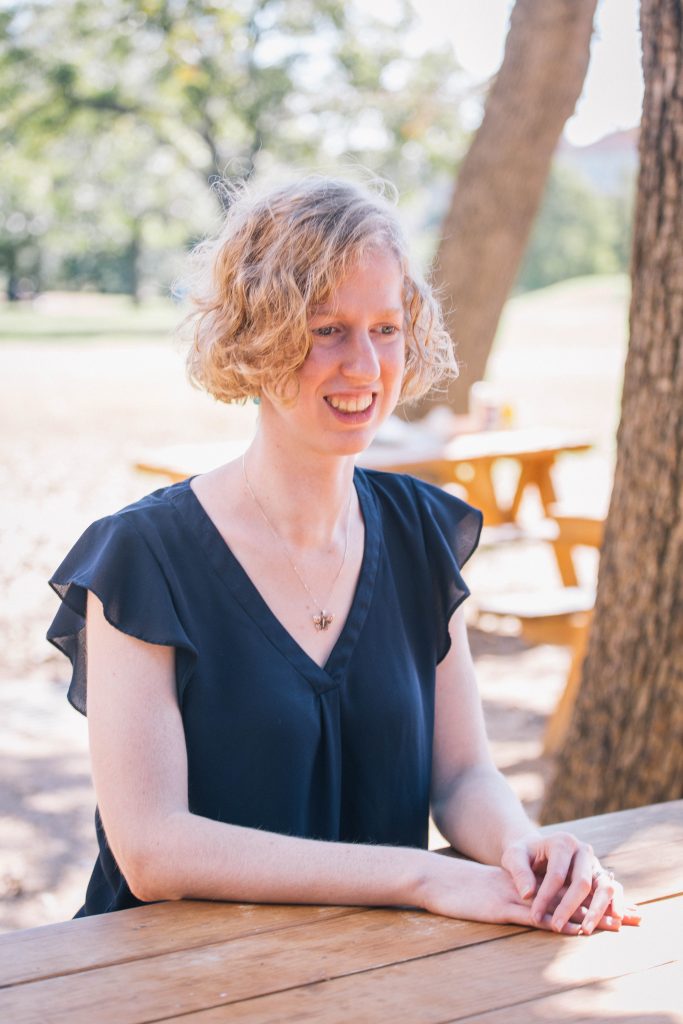 PREJUDICES
PREJUDICES
Do you feel that people still have a lot of prejudice about blindness?
Yes, especially in México. When I was doing my thesis on a comparative study of disabled children in public schools in México and the United States, it was very difficult to find information in México, because there are no databases for that in the Ministry of Public Education.
The population census is not very complete in México either, people often hide information because there is more stigma. Out of pride or ignorance, they do not want to declare that their children have one disability or another. It’s as if they are locked in a closet.
A disabled woman in a wheelchair helped me a lot, a woman named Maria Angel, who worked with the Monterrey TEC to create this access and finish the comparative study for my thesis.
What do you think of the «blind person» label, does it bother you being called that?
No, because that’s what I am, that’s what political identity defines as «visual disability» and it does not bother me, and I’m Latina. However, the intersection of being Latina and disabled does not take others very well. Now that I am here, I realize that although they have moved forward, there is a lot of stigma about blindness in the US also.
A GREAT SPIRIT FOR IMPROVEMENT AND ADVOCATE FOR HELPING OTHERS
How did you come to Austin?
I came to the United States because I wanted an opportunity to study even with my disability. But getting here to Austin and to go to college was a shock. Well, while living with my family in Monterrey, I did not feel anything abnormal about my situation. And I didn’t use a cane, I didn’t identify myself as a blind person.
After the orientation of the university at UT, I found they could not help me because they did not have any staff to assist us. The next day, I had to go to the office for the disabled, the distance between the Jester building and Dean Keaton, the building for people with disabilities, is huge. I don’t know how I got there, I went alone, I do not know how I managed not to hurt myself.
When I got there, the first thing they said to me was «you need a cane, because you’re blind.» Nobody had told me before to my face «you’re blind». That was my first blow. To accept it.
That bothered me almost all that week. I didn’t eat, because I didn’t know how to navigate my way to the cafeteria and I don’t like to ask for help automatically. But the design of the campus doesn’t have any logic either. I called my mom, to say «I don’t want to be at this university, I better come home.»
Did you go back to México?
I decided to stay. My father had studied outside México and he understood me, he told me «I’ll make a deal with you – promise me that you stay one year at UT and if in the end you still want to return, we will take you back to México. For now, you have more opportunities to study in Austin.”
I had to overcome the idea that people would not judge me simply because I was carrying a cane. But it was not easy. The first four months I fell into a depression, I was in class and then I went back to my room and there I stayed. I was very afraid to do more.
How did you adapt in order to finish your degree?
To my great fortune, I met a woman who became my mentor. She was the first blind person I had ever met, other than my brother, and she was married, had a house and wanted to have children, her life was perfectly normal. She did research work at the university and if I had not met her, and without her support, I would probably have returned to México.
Later, seeing that there is no support organization for students with disabilities, I decided to do something. I started one I called: Disability Advocacy Student Coalition. It was not easy to spread the word. I would get on with my table and chair at West Campus – and nobody would come. Any word that starts with «DIS_» people do not want to come close. But at last after a year of insisting, people started coming.
What was the first action of this new organization?
The first objective was to create awareness of us, that people with disabilities exist. In October of each year we had the month of Disability Awareness, and for the spring semester I organized the «Disability Awareness Week».
I also organized an event called «Dinner in the Dark» – I rented a space in UT in the basement, without windows, with tables, we bought food and people came and entered and everything was dark and we started a conversation in the dark. We brought music, with a blind friend who played the guitar. Listening to music in the dark is a very different experience. It helps create a space to express yourself.
Today, thanks to these efforts, there is a Welcome Committee to support students with disabilities at the start of their freshman year. And that was 8 years ago!
The City of Austin has programs for the disabled and help for doing almost everything, What activities you still can’t do?
I cannot drive. Now I take the bus, but it was hard for me to have the confidence to do it. Because I came from México, where I never used public transportation, much less as a blind person. I would like to see the Austin bus routes go through to my house. But at the moment there are none. I usually use Uber as transportation to get to work and a friend takes me home. But it gets complicated if I have to leave work late.
Apart from that, I can do almost everything, but some things I struggle with, for example, I can’t cook. The flames still frighten me. We still don’t have a stove «blind-friendly» (laughs).
How could you help pass the HB10 law during your work recently received from the university?
After I finished college I got a fellowship and worked on this bill almost two years under the Hogg Foundation. I had to learn the whole law from beginning to end, I feel it is «my law». I proposed it, together with the work team, the reasons why insurance companies should accept paying disabled people with mental health the same way as people with physical disabilities. Finally HB10 was approved in Texas on April 5, 2017, with a favorable vote of 130 to 12.
I wanted to be a lawyer and help people on a case-by-case basis. But I thought that if you can turn your ideas into laws, like we did at the Capitol to help people with disabilities, you can benefit thousands more people at once. In the future, I want to continue working in advocacy programs for the disabled and help more people.
What else do you think should be done?
We must eliminate the fact that the stigma that being a disabled Latina woman is not a good intersection or that you take a back seat. You have to be more aware that there is now a National Coalition for Latinos with Disabilities that started in 2016, at the University of Illinois in Chicago. The objective is to create a network of people and organizations throughout the country that work with and for Latinos with Disabilities, so that they can share resources and collaborate and prevent rights movements of Latinas, with disabilities, from taking a back seat.
Last summer there was an annual conference in Austin, Texas to build a community of Latinas with disabilities, to share our stories with each other and provide updated information on activism, policies and research at the intersection of disability and being latinos. For example, on June 1, our CEO María Victoria Díaz spoke about «Access to media, culture and entertainment for the Latino community with disabilities in the United States.» Unfortunately, our community of Latinos with disabilities does not claim their right to this access.
There are several support committees, especially a committee for immigration issues. There are still many people with disabilities who are going to have to be returned to their countries – and they will not have support – a conversation that did not exist.
In detention centers there have been many cases of disabled people, for example a deaf person, if they are not given an interpreter, how will they know their rights? They do not give them attention and a lot of controversy has been created about that. I think that their voices count no matter what.
What gives you the most satisfaction in your work?
After finishing the bill I was hired by the State of Texas in Austin, in the Health and Human Services Commission. Health and education are something that all people must have access to. So more access is better and that gives me satisfaction.
You have studied and worked so hard, do you have time for personal interests?
Yes, I love going to the movies, especially if they are films with a lot of dialogue. And since nearly all my world is audio, I love listening to radio stations through my IPOD, so I can stay informed with news from around the world. For example, I heard that on October 3 they just passed a law in Mexico, through the Supreme Court of Justice of the Nation, that all children with disabilities should be integrated into the general or ordinary education system. And I also listen to a lot of music, and I love to dance!
Not to be disrespectful, but is there a funny story that has arisen because of your disability?
I remember one day I was working in the capitol with the HB10 law, I was going to a meeting room with another person, and she said «I’ll take you, it’s around here», «ah, yes, but I think that it’s over here, I indicated», but I went with her because I thought she saw better. At last we arrived, but at the wrong place! The meeting site was exactly the way I had told her!» I think sometimes that we the persons that can’t see, see better. (laughs). In this case, the blind follows the unblind? no?
Mónica wants to share the following tips when trying to help blind people.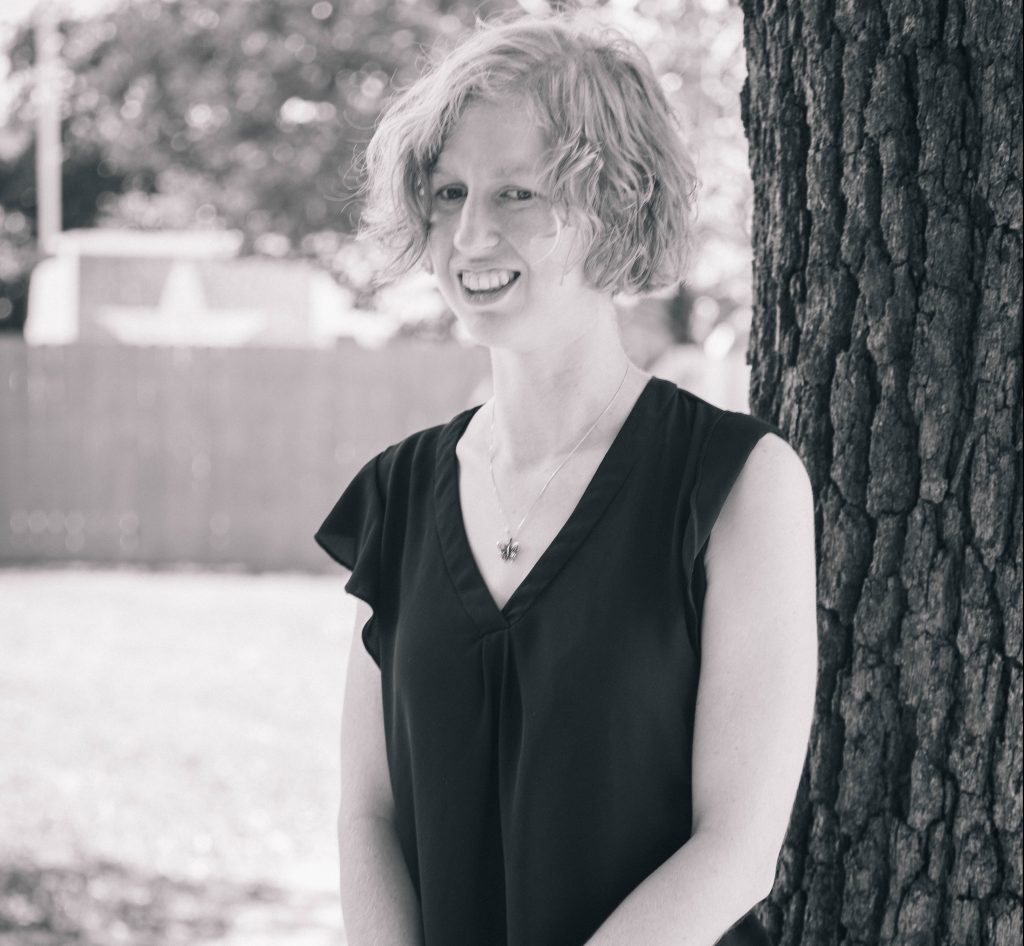
- The most important thing when it comes to helping a blind person is to tell her and show her how she can do it on her own, not like most, who just do, period. It is more important and they will feel better when they are able to do it for themselves.
- Also when you want to help a disabled person on the street, please ask her first if she needs help. We really appreciate that they want to help us, but most people don’t know how, and they just pull us by the arm, assuming we need help, without asking. That can hurt us, because we could lose balance and fall.
- It is preferable not to refer to a «normal» person when talking to a person with a disability. What does it mean to be «normal»? For whom is it «normal»? For me it’s normal not to see, and for you, being normal means that you can see? (laughs).
- Finally I would like to ask you to use the word «person» when you address us before «disabled», because before everything else, we are people.
